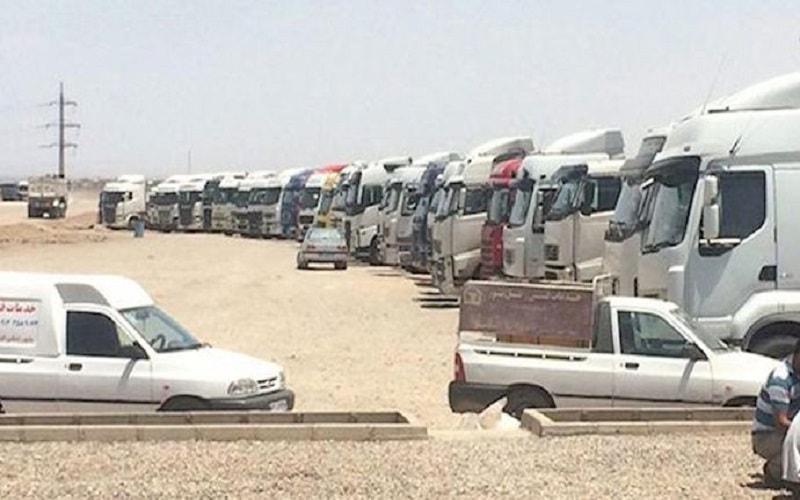The uprisings in Iran aim to establish a democratic nation
Take a look at the recent demonstration in various cities of the country
People’s Demonstration of Amir Kabir Industrial district in Isfahan
On July 31, 2018, on the 9th day of the truck drivers’ nationwide strike, the protest movement, restarted throughout the streets of several Iranian cities.
People in the cities of Karaj, Esfahan, Shiraz, and Rasht came to the streets in support of the truck drivers’ strike breaking the fear atmosphere created by the tyrannical mullahs.
Demonstrators’ initial slogans were against high prices, unemployment, poverty and inflation, but the slogans quickly shifted to political, clearly calling for an end to the rule of Iran’s mullahs.
The uprising and protests continued at the Shahpour district in Isfahan on August 1 and led to a clash between the youth and the repressive forces.
Some slogans in the recent protests
A look at some of the slogans chanted in the recent demonstrations mirrors the general desires of the demonstrators.
In Karaj people chanted:
“Our enemy is right here; they (regime’s leaders) lie when they say it is America.”
“Khamenei is being deified, while the nation is living in poverty”
“Reformist, Hard-liner, Game is over!”
“The uprisings continues as long as the dictator is in the office!”
“Cannon, tank, rocket, mullahs must get lost”
“Death to Khamenei”
In the demonstrations in Isfahan, people chanted:
“Death to high prices”
“Death to dictator!”
https://twitter.com/nikooamini/status/1026091150665506816
The people of Rasht protested against high prices and economic crisis, but quickly expressed their anger against the clerical regime. In Rasht and Shiraz, the slogans were:
“Death to high prices”
“Do not be afraid, do not be afraid, we are all together”
“Enough is enough, You Iranians! Show your honor!”
“Death to high prices”
Features of the recent demonstration
- The demonstrations were held under the conditions that the mullahs’ suppressive forces were put on full alert for countering any movement. Particularly, due to the calls from social networks which were published in the days before, the suppressive forces were informed of the time and even the places of the demonstrations. But despite all the consequences, people succeeded to hold their protests.
- The active and massive presence of women in the protests, particularly in Karaj, was commendable.
- In the latest demonstration, the presence of youth and their role as combatants was another significant point.
- The swiftness of conversion the economic slogans to political slogans, especially the slogan demanding overthrow, was outstanding.
Other Protest Movements in these days
The recent protests in the cities of Isfahan, Karaj, Gohardasht, Shiraz, and Rasht hit the headlines, but with these major developments:
First, truck drivers’ strikes continued in many cities.
Secondly, the regional strike of the railway workers continued in the cities of Tabriz, Zanjan, Qazvin, Drood and the Northeast Railroad District.
At present, Tabriz railway workers are on strike at the railway station.
In Tehran and Sari, the regime tried to prevent frustrated people from starting the protests. Simultaneously, there was disturbance in the Tehran bazaar, but the regime tried to prevent unrest by deploying its criminal guards.
Also, the routine protests of looted people continued in several towns.
Heightening the uprisings
The protests that have intensified in the form of social uprisings in recent months in Iran, began in late December and early January this year with demonstrations of people in Mashhad against the dire economic conditions. The protests quickly changed to anti-regime protests and were spread nationwide.
Those were the first and the most powerful waves of uprising. They initiated the second wave, which culminated in massive uprisings in Kazeroun, followed by a general strike of truck drivers.
What has started now from July 23 and with the second round of truck drivers’ strike, is going to slowly turn into the third round of the uprising of the Iranian people.
One of the most important features of the new round of uprising is the emergence of political solidarity between various social classes and the presentation of the national solidarity of the demonstrators on the streets, which by itself in this situation, is a strong point of movement that would not let the regime to manipulate the demands of uprisings.
An uprising with such features will undoubtedly lead to larger protest movements. All protestors from all different walks of life will bring their legitimate demands to the streets, and put the regime at a harsher impasse.
Mrs. Maryam Rajavi, the president-elect of the Iranian resistance, who is leading an international campaign for a democratic change in Iran, in a message praised the demonstrators and emphasized that protesters will not rest until the Iranian people and nation are free.
